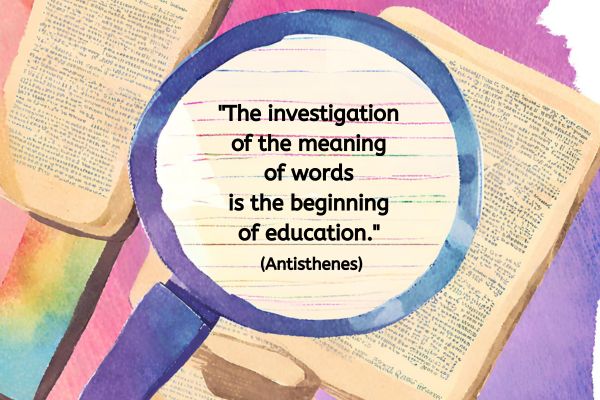Unveiling the Power of Words in Coaching: A Journey of Meaning and Connection

Todays quote of the day is:
“The investigation of the meaning of words is the beginning of education,” (Antisthenes)
As coaches, understanding the depth and nuances of words empowers us to foster clearer communication and, in turn, drive transformative outcomes for our clients as we engage in an education about how the world looks for our clients.
The Challenge of Ambiguous Words:
How often do clients approach us with aspirations of gaining more confidence or achieving success? These seemingly straightforward expressions can be laden with diverse meanings depending on one’s perspective. The word “wisdom” is another prime example – a term frequently used but interpreted differently by each individual.
Acknowledging this challenge, I can find that at certain stages it is importatn for coaches to delve into the investigation of words and their meanings. This proactive approach sets the stage for enhanced clarity and ensures that both coach and client are on the same page, working towards a shared understanding of the client’s goals.
The Conversation of Clarification:
While not every coaching session necessitates a deep dive into word meanings, initiating conversations about language early on can be transformative. I often consider setting the tone by expressing the possibility of seeking clarification on certain words. This practice is not about doubting the client’s use of language but rather a commitment to ensuring alignment in interpretations, especially when these words become central to the coaching process.
As I often work with coaches who can fall down a rabbit hole of annalysing why I’m using the language I have or wondering if there’s a hiden meaning behind why I asked a question – I tend to address that early so less likley to be any noisy self doubt etc going on in my clients head distracting from our coaching conversation later. So mentioning I may clarify interpretations of what a word means for them can fall naturally into the same conversation.
The Exploration’s Impact on Communication:
Exploring words and their meanings can significantly improve the coach-client communication dynamic. By unraveling the layers of language, coaches can unveil the client’s unique perspectives and aspirations. This not only strengthens the connection between coach and client but also ensures that coaching conversations are grounded in a shared understanding.
The Path to Better Connection:
The exploration of words and language serves as a bridge that connects coaches with their clients on a deeper level. It allows for a more profound understanding of the client’s world and facilitates the creation of tailored coaching responses that resonate with their unique interpretation of key concepts.
Conclusion:
In the ever-evolving landscape of coaching, the investigation of words and their meanings emerges as a powerful tool for fostering effective communication and connection. As coaches, embracing the richness of language propels us towards a more profound understanding of our clients’ aspirations, ultimately paving the way for transformative personal growth.
So, how does the exploration of words and language impact your coaching practice? We’d love to hear your thoughts on this fascinating journey of meaning and connection.
About Jen Waller

Jen Waller is on a mission to support, nurture and encourage coaching skills and talents from non-coach to coach and beyond.
As an experienced coach and trainer Jen is happy to utilise all skills at her disposal to assist clients from getting out of their own way and making a difference in the world with their coaching. Find out more about the support Jen offers here.



